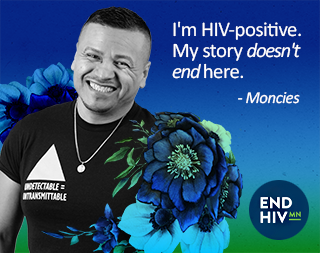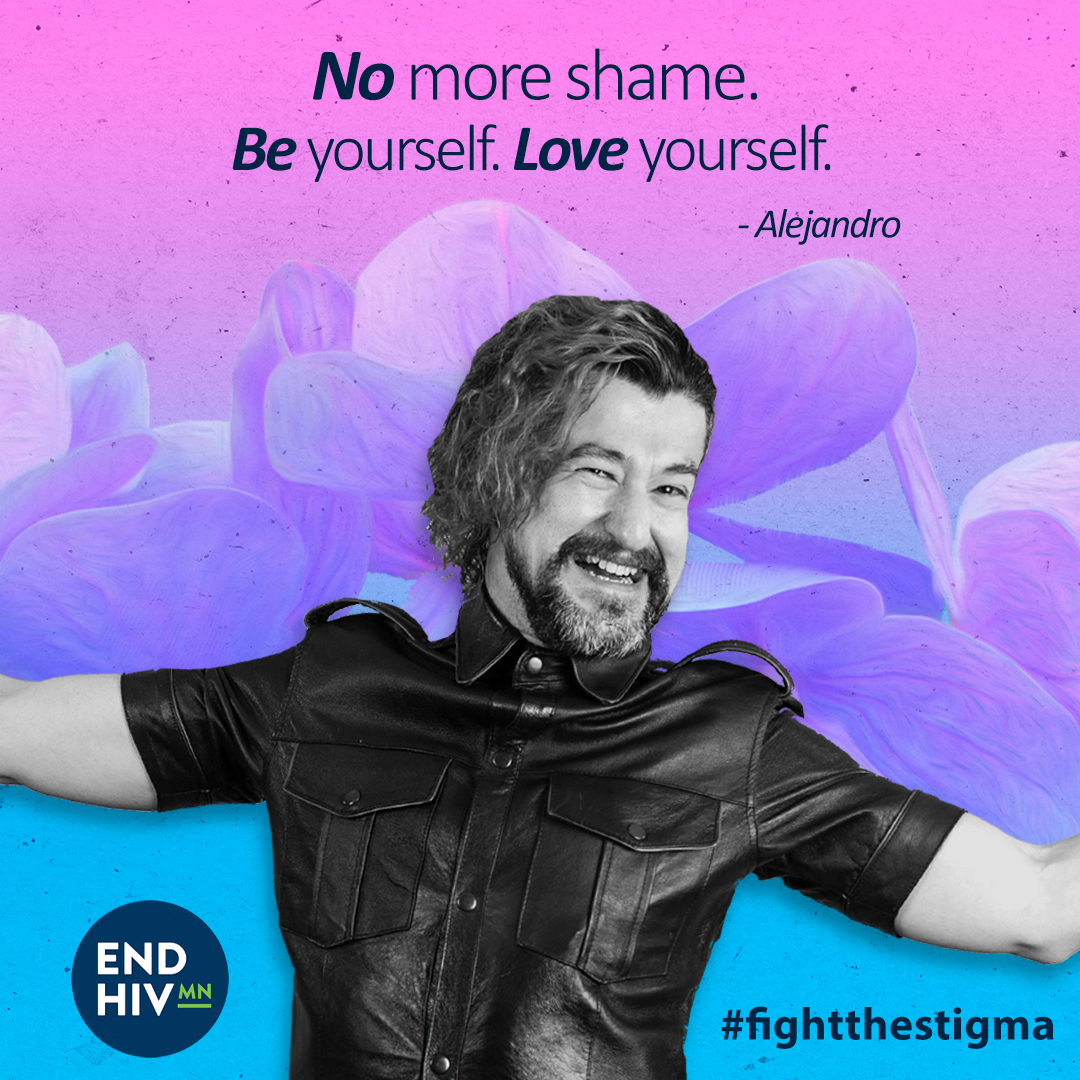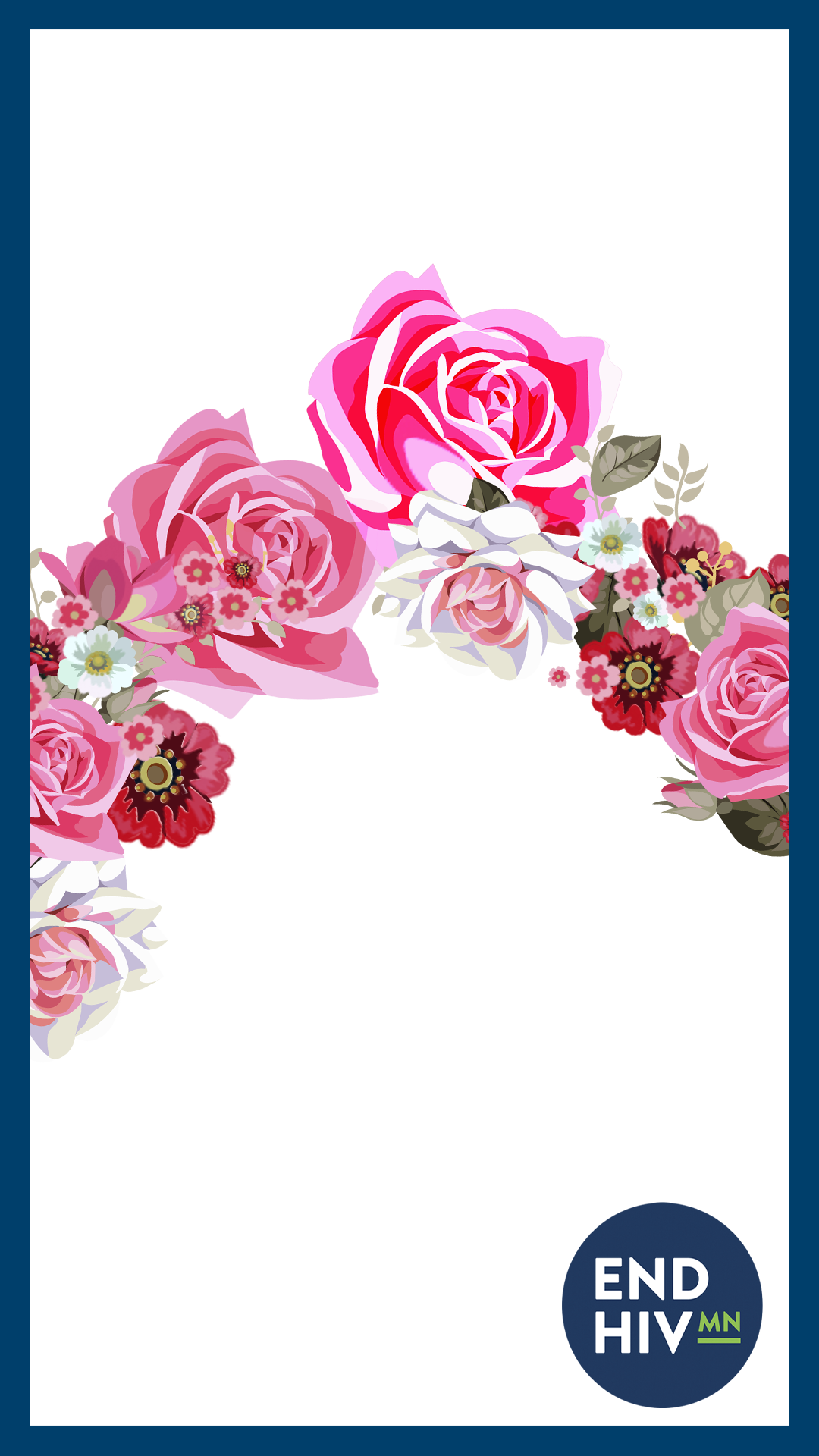Contact Info
HIV Prevention, Care, and Anti-Stigma Social Media Toolkit

This campaign is a collaboration between many community organizations, advocates, the Minnesota Department of Health and the Minnesota Department of Human Services. The campaign and its graphic elements are a reminder that HIV-related stigma is one of the biggest barriers to getting tested, treated, and being undetectable. Everyone has a unique story to tell in ending the epidemic. Please use these graphics and resources to promote HIV prevention, care, and anti-stigma in your community.
On this page:
Prevention and Care Messages
Featured Models
Downloadable Graphic Elements
Contact
Prevention and Care Messages
There are many tools to promote HIV prevention and care. This collaborative project was born out of the idea that in order to be successful, a campaign must promote and encourage conversations about HIV testing, Pre-Exposure Prophylaxis (PrEP), HIV treatment, HIV care and support services, Undetectable equals Untransmittable, harm reduction, and combating HIV stigma.
You may use these suggested social media posts or generate your own to share with your community.
#HIV #GetTested #hivtesting #hivaids
- The only way to know your HIV status is to get tested. Knowing your status gives you powerful information to keep you and your partner(s) healthy.
- For people with undiagnosed HIV, testing is the first step in maintaining a healthy life and preventing HIV transmission.
- An estimated 1.2 million people in the United States have HIV, including about 161,800 people who are unaware of their status. Nearly 40% of new HIV infections are transmitted by people who don’t know they have the virus.
- The CDC recommends that everyone between the ages of 13 and 64 get tested for HIV at least once as part of routine health care.
#LetsStopHIVtogether #sciencenotstigma #stopHIVstigma #speakouthiv
- A welcoming community can make a difference for someone with HIV. What are ways we can all build a supportive community today?
- Small gestures go a long way to help end HIV stigma. A handshake or hug can say “you matter, not your HIV status.”
- When talking about HIV, certain words and language may have a negative meaning for people living with HIV. Choose supportive and science-based language!
- Spread science, not stigma! Get educated and share facts about HIV using person-focused language. Use the CDC's Ways to Stop HIV Stigma and Discrimination for ideas.
- An HIV stigma-free future for everyone can begin with family. When’s the last time you’ve talked about HIV at home?
#PrEPNow #StopHIV #HIVPrEP #PrEPstopsHIV
- PrEP (pre-exposure prophylaxis) is medicine people at risk for HIV take to prevent getting HIV from sex or injection drug use. When taken as prescribed, PrEP is highly effective for preventing HIV.
- There are more than one million people at risk for HIV who could benefit from pre-exposure prophylaxis (PrEP), medication that is safe, effective, and prevents the spread of HIV.
- There is medication that can help prevent HIV. Take control of your health and see if PrEP is right for you.
- Most insurance plans and state Medicaid programs cover PrEP. There are also other programs that provide PrEP for free or at a reduced cost.
- If you haven’t heard about PrEP before today and you’re sexually active, find out about ways to protect your health with HIV prevention medication.
#RyanWhite #HIV #HIVTreatment
- Minnesota's Ryan White HIV/AIDS Programs provide a comprehensive system of HIV primary medical care, and services like food, housing, transportation, and medications for those with HIV who qualify. If you are living with HIV, find out if you quality.
- For over thirty years, the Ryan White HIV AIDS Program has provided HIV medical care, medications, and other services to people with HIV who qualify. If you have HIV, find out if you qualify.
- More than half of people with diagnosed HIV in the United States receive services through the Ryan White HIV/AIDS Program each year. That means more than half a million people received services through the program.
- Over the last three decades, Ryan White HIV/AIDS Programs have played a critical role in the United States’ response to HIV. What was once a deadly disease is now a manageable, for those receiving HIV medical care and taking medications. If you are living with HIV, find out if you qualify.
#UequalsU #stophivstigma #JT400K #UEqualsU
- When people living with HIV are on effective treatment, it suppresses the virus in the blood to a level that is too low to be measured by lab tests. This is called being undetectable.
- U Equals U (U=U) stands for “undetectable equals untransmittable.” This means that people living with HIV who take their medications as prescribed and have an undetectable level of virus in their blood are unable to sexually transmit the virus to others.
- If you are a person living with HIV and the virus level in your blood is undetectable, you cannot pass on the virus to others through sex.
- U=U means that people living with HIV can have long and healthy lives.
- U=U means that people living with HIV who achieve and maintain an undetectable viral load—the amount of HIV in the blood—by taking medications as prescribed cannot sexually transmit the virus to others.
HIV Education Scripts
- 00:15 second script
PrEP stands for Pre-Exposure Prophylaxis. This is a way of protecting yourself from getting HIV by taking a tablet once a day every day. PrEP does not prevent you from other sexually transmitted infections, so be sure to take steps to reduce your risks. - 00:15 second script
If you test positive for HIV, it's important to get into medical care and begin taking HIV medication that can help you stay healthy for many years. If you need to find an HIV testing center, get linked to HIV medical care, or learn more about medication that can keep you from getting HIV, visit HIV.gov. - 00:30 second script
People who get and keep an undetectable viral load by taking medications as prescribed by a doctor can stay healthy for many years and have no risk of transmitting HIV to their sex partners. This is known as undetectable equals untransmittable or U=U. If you need help finding an HIV testing center, getting linked to HIV medical care, or learning more about medication that can keep you from getting HIV, please go to HIV.gov.
HIV Anti-Stigma Scripts
- 00:15 second script
A welcoming community can make such a difference for someone with HIV. Talking openly about HIV can help normalize the subject. To find opportunities to correct misconceptions about HIV and help others learn more, go to HIV.gov. - 00:15 second script
Friends don’t let friends perpetuate HIV stigma. HIV stigma is negative attitudes and beliefs about people with HIV. If you have a friend with HIV, offer support by learning the facts. Learn more at HIV.gov. - 00:30 second script
HIV stigma is rooted in a fear of HIV. Many of our ideas about HIV come from the HIV images that first appeared in the early 1980s. There are still misconceptions about how HIV is transmitted and what it means to live with HIV today. Talking openly about HIV can help normalize the subject. It also provides a chance to correct misconceptions and help others learn more about HIV. But be mindful of how you talk about HIV and people living with HIV. - 00:30 second script
What can be done about HIV stigma? Well, you can talk about it and share the facts! Talking openly about HIV can help normalize the subject. It also provides opportunities to correct myths and help others learn more about HIV. But be mindful of how you talk about HIV and people living with HIV by sharing science not stigma. We can all help end HIV stigma through our words and actions in our everyday lives. Let's lead others with supportive behaviors.
Above social media content formatted for download and print: HIV Prevention and Care Messages for Social Media (PDF).
Featured Models

Minnesota models showcased in this END HIV MN campaign believe in busting stigma through sharing their own stories.
Downloadable Graphic Elements
Service providers, health care professionals, community partners, advocates... everyone has an important role to play in decreasing HIV stigma and increasing HIV awareness. You may include these graphics on your website, resources, social media messages, and more.
This is Phase 1 of the project, which includes a limited number of anti-stigma, prevention, and care messages. Stay tuned for project updates and the release of new graphics.
Agencies may co-brand these items but must include the END HIV MN insignia and follow logo spacing requirements found at MDH Branding. More information on general standards, color palletes, and file formats can be found there also.
To save a PNG file, right-click the blue underlined hyperlink and select "Save target as..." or "Save link as...".
Advocacy
Rectangular image- Ka'Milla: 1080x566 (PNG)
Rectangular image- Dylan: 1200x675 (PNG)
 Anti-Stigma
Anti-Stigma
Square image- Alejandro: 1080x1080 (PNG)
Rectangular image- Austin: 1200x675 (PNG)
Rectangular image- Moncies: 1200x675 (PNG)
Rectangular image- Tesha: 1200x630 (PNG)
Awareness Days
National Black HIV/AIDS Awareness Day
Rectangular image- Alex: 1200x630 (PNG)
Rectangular image- Gregory: 1200x630 (PNG)
Rectangular image- Daphne: 1080x566 (PNG)
Rectangular image- Ricky: 1200x675 (PNG)
National Women and Girls HIV/AIDS Awareness Day
Rectangular image- Daphne: 1200x630 (PNG)
Rectangular image- Ka'Milla: 1200x675 (PNG)
Rectangular image- Joli: 1200x675 (PNG)
Rectangular image- Tesha: 1200x630 (PNG)
Rectangular image- Mariah: 1200x675 (PNG)
National HIV Testing Day
Rectangular image- Alex: 1200x630 (PNG)
 Living Well
Living Well
Rectangular image- Joe: 800x1000 (PNG)
Rectangular image- Cree: 1200x675 (PNG)
Rectangular image- Johan: 1200x675 (PNG)
Rectangular image- Kevin: 1200x675 (PNG)
Rectangular image- Aaron: 1200x630 (PNG)
Rectangular image- Shea: 1200x630 (PNG)
Customizable frame image- frame (PNG)
Undetectable Equals Untransmittable
Square image- Michael: 1080x1080 (PNG)
Rectangular image- Mariah: 1200x675 (PNG)